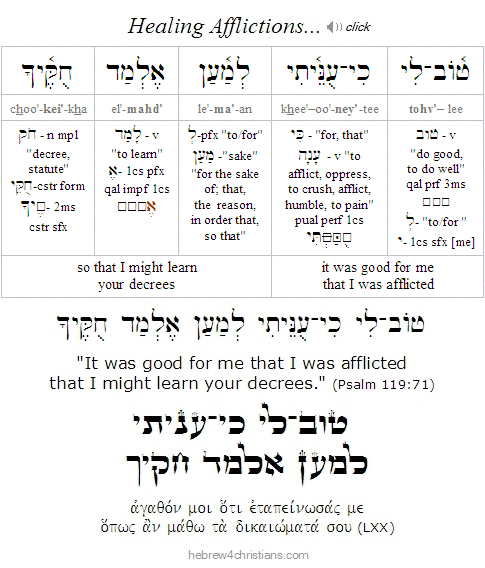|
YOU MAY SOMETIMES STRUGGLE with your faith – not by questioning whether Yeshua is the Savior who died for your eternal healing, but in an hour of testing, when you feel exhausted by pain, when you pray for relief, seeking God in your cries and tears, but the pain continues, and then you are left rationalizing why you were denied your supplication, why your suffering has been prescribed – for surely, you believe, God can heal you by simply saying the word – and then you wonder to what extent you need to be broken in order to be fully remade... As C.S. Lewis once said, "We are not necessarily doubting that God will do the best for us; we are wondering how painful the best will turn out to be" (Letters of C.S. Lewis). There is a trust issue in suffering, and an intimacy that comes through its fires...
The difficulty of personal suffering is intensely intimate: how do you keep hope in the midst of this tension? "Lord I believe; help my unbelief" (Mark 9:24). How do you affirm that your heavenly Father will heal you but at the present hour you must endure suffering? Do you devise a "soul-building theodicy" seeking to explain your struggle – providing an answer about the "why" of your suffering – or do you attempt to sanctify suffering as a means of healing others by the grace of the Messiah (Col. 1:24)? Or do you wither in your despair? As Soren Kierkegaard said, "It is one thing to conquer in the hardship, to overcome the hardship as one overcomes an enemy, while continuing in the idea that the hardship is one's enemy; but it is more than conquering to believe that the hardship is one's friend, that it is not the opposition but the road, is not what obstructs but what develops, is not what disheartens but ennobles" (Four Upbuilding Discourses, 1844).
When Yeshua victoriously proclaimed, "It is finished" just before he died on the cross, he foreknew that his followers would experience a "purging process," a "refining fire," and time on the "potter's wheel" to perfect their sanctification. At the cross of Yeshua death itself was overcome – and all that it implies – and yet it is nevertheless true that we will suffer and die and that death persists an enemy (1 Cor. 15:26). While we celebrate the reality of the final redemption, the "instrumentality of our sanctification" needs to be willingly accepted and endured. I say "endured" here because I don't think we will ever have a complete answer to the question of "why" we undergo the various tests we face in this life. Our disposition in the midst of this ambiguity, in the midst of seemingly unanswered prayers, is where our faith is disclosed: will we despair of all temporal hope or not? Will we console ourselves with the vision of a future without tears and loss – a heaven prepared for us? Will we trust God with our pain and submit to his will, or will we "curse God and die" inside – losing hope and despairing of all remedy?
God forbid you should give up now, friend. Faith "sees the unseen" and believes the day of our ultimate healing draws near. Stay strong and keep your hope alive (Psalm 27:14).
 |
Hebrew Lesson
Psalm 119:71 reading (click):
<< Return
|



